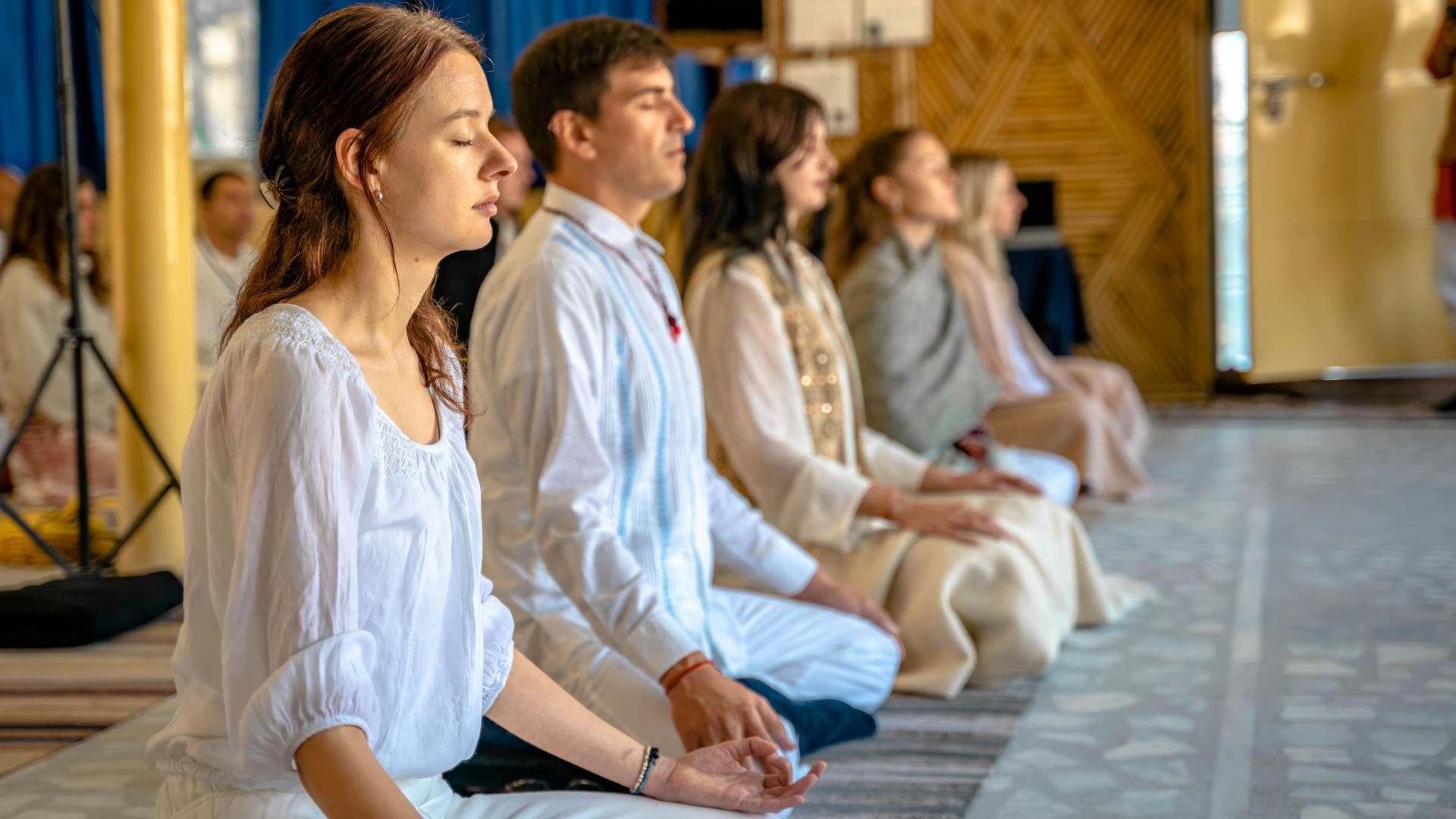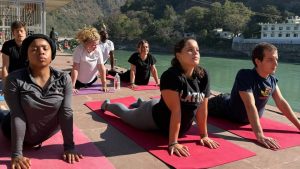In today’s hyper-connected world, the need for mindful disconnection has never been greater. More individuals are turning to yoga meditation retreats not as a luxury, but as a vital pause for mental, physical, and emotional restoration.
If you’re contemplating a retreat into your inner self, it’s essential to understand whether such a retreat aligns with your lifestyle, goals, and personal growth journey.
What Is a Yoga Meditation Retreat?
A yoga meditation retreat is a structured getaway designed to offer a harmonious blend of yogic practices, breathwork, and deep meditation techniques. Unlike regular vacations, these retreats immerse participants in spiritual disciplines, healthy routines, and holistic living.
Most retreats are nestled in serene locations – mountains, forests, beaches, or spiritual hubs like Rishikesh, Bali, or Costa Rica, offering an environment conducive to inner transformation.
Who Should Consider a Yoga Meditation Retreat?
A yoga meditation retreat is ideal for:
- Stressed professionals needing a break from constant mental activity
- Spiritual seekers exploring consciousness and mindfulness
- Yoga practitioners aiming to deepen their practice
- Individuals recovering from burnout or emotional trauma
- Anyone craving clarity, peace, and purpose
If you often feel overwhelmed, disconnected, or uninspired, a retreat can be the reset button you’ve been looking for.
Benefits of Attending a Yoga Meditation Retreat
1. Mental Clarity and Emotional Healing
A retreat removes the distractions of everyday life. Through meditation, journaling, and guided silence, many participants experience emotional release and mental stillness. Stress dissipates. Anxiety fades. For many, insight and emotional breakthroughs surface naturally.
2. Enhanced Yoga Practice
Practicing yoga in an immersive environment, under the guidance of certified yoga instructors, helps you:
- Refine asanas with proper alignment
- Understand yogic philosophy on a deeper level
- Develop a personal routine for long-term practice
- Integrate pranayama (breathing techniques) effectively
Whether you’re a beginner or advanced yogi, the retreat setting, such as that at Saptkaya Yoga School, offers unparalleled learning and embodiment.
3. Digital Detox and Mindful Presence
Yoga retreats often require digital disconnection, encouraging you to be fully present. This unplugging cultivates mindfulness, improved focus, and an authentic connection with nature and self. Participants often rediscover the joy of simplicity—watching sunrises, walking barefoot, eating mindfully.
4. Physical Detox and Nourishment
Expect wholesome, plant-based meals that are designed to aid detoxification and rejuvenation. Many retreats, such as those offered by Saptkaya Yoga School in Rishikesh, include Ayurvedic treatments, Panchakarma therapies, and herbal cleanses, allowing your body to reset from the inside out while aligning with the ancient healing wisdom of India.
5. Spiritual Growth and Self-Discovery
The retreat becomes a sacred container where you explore your belief systems, emotional patterns, and spiritual longing. With regular meditation, satsang (spiritual discourse), mantra chanting, and silent hours, the inner journey deepens. This spiritual exploration often leads to:
- Greater inner peace and contentment
- Heightened self-awareness
- Reconnection with one’s purpose or life path
Note: Some retreats also include modern yogic techniques like the Cyclic Meditation Technique, which blends movement and rest to help release mental agitation and enter meditative awareness more naturally.
What it is:
A structured technique that combines stimulating yogic postures and deep relaxation in a cyclic pattern.
Key Features:
- Developed by SVYASA University, India.
- Based on ancient yogic texts like the Mandukya Karika.
- Focuses on balancing the mind-body connection through alternating phases of activity and rest.
- Usually 20–30 minutes long.
- Practiced as a daily self-care technique or used in therapeutic settings.
How to Choose the Right Yoga Meditation Retreat
1. Location and Environment
Choose a destination that resonates with your needs—mountain solitude, ocean serenity, or spiritual energy hubs. Sacred destinations like Rishikesh—India’s yoga capital—are home to some of the most authentic meditation retreats. Joining a meditation retreat in Rishikesh offers not only traditional wisdom but also the serenity of the Himalayas and the Ganges.
2. Style and Structure of the Program
Retreats differ vastly in focus. Some emphasize traditional Hatha or Ashtanga Yoga, while others blend Vinyasa flows, Kundalini practices, or restorative sessions with mindfulness, breathwork, and sound healing.
- Daily yoga sessions
- Guided meditation practices
- Breathwork or pranayama
- Workshops or lectures on yogic philosophy
- Time for self-reflection and rest
📌Programs at Saptkaya Yoga School integrate all of the above, including unique healing sessions with sound therapy and Ayurvedic wisdom.
👉 Connect with Us to Learn More!
3. Duration and Intensity
Retreats range from weekend getaways to month-long immersions. While some programs span 21 to 30 days, many highly effective retreats offer transformative experiences in just 4 to 7 days, providing deep rest, clarity, and renewal without requiring a long commitment. These shorter retreats are suitable for both newcomers and seasoned practitioners alike.
4. Teachers and Lineage
Look for retreats led by certified instructors with authentic training in yoga and meditation. Instructors who are also mindfulness coaches, Ayurveda experts, or spiritual guides add depth to your experience.
5. Group Size and Atmosphere
Smaller retreats (5–20 participants) often offer more individual attention and intimate settings. Larger ones can be energizing with a collective vibe. Choose based on your preference for privacy or community.
What to Expect During a Typical Day at a Yoga Meditation Retreat
A day at a thoughtfully curated yoga meditation retreat often follows a rhythm that balances movement, stillness, nourishment, and reflection. At places like Saptkaya Yoga School, a typical schedule might look like this:
- 06:00 AM – 08:00 AM – Yoga, Pranayama & Meditation
Begin the day with energizing Hatha or Vinyasa flows, combined with breathwork and guided meditation to awaken the body and mind. - 08:00 AM – 09:00 AM – Ayurvedic Breakfast
A nutritious, dosha-balancing meal to support vitality and digestion. - 09:30 AM – 11:00 AM – Sound Healing Session
Deeply restorative sessions using crystal bowls, Tibetan singing bowls, and chanting, designed to reset your nervous system. - 11:00 AM – 12:00 PM – Rest & Personal Reflection
Quiet time for journaling, contemplation, or integration. - 12:00 PM – 01:00 PM – Ayurvedic Lunch
A wholesome meal aligned with Ayurvedic principles to support healing and balance. - 01:00 PM – 04:00 PM – Free Time
Space to explore Rishikesh, relax, or simply rest and reset. - 04:00 PM – 05:30 PM – Yoga Philosophy Session
Insightful discussions on yogic lifestyle, sound healing theory, and spiritual teachings. - 05:30 PM – 06:30 PM – Journaling & Free Time
A chance to process your inner journey, read, or practice mindfulness on your own. - 06:30 PM – 07:30 PM – Ayurvedic Dinner
A light, nourishing evening meal to support restful sleep and digestion.
This kind of structure supports deep inner work, while still offering flexibility and personal space. It creates an ideal balance between activity and integration, suitable for both experienced practitioners and those newer to the path.
Common Transformations Reported by Our Participants
At Saptkaya Yoga School, participants often describe their retreat experience as deeply life-changing, not just a break from routine, but a powerful shift toward inner harmony and purpose. Many leave with:
- A renewed sense of energy, joy, and presence in everyday life
- Stronger emotional resilience and clarity, supported by mindfulness and breathwork
- Healthier lifestyle habits, including conscious eating, daily movement, and digital balance
- A deeper spiritual connection, cultivated through meditation, sound healing, and yogic philosophy
- Healing in personal relationships often emerges from inner emotional release and self-reflection
- A lasting meditation and yoga practice, seamlessly integrated into their home routine
These aren’t fleeting effects—they reflect a profound inner recalibration. For many, this journey becomes the starting point of a more awakened, aligned, and heart-centered life.
When Not to Attend a Yoga Meditation Retreat
While most can benefit, retreats may not be ideal if:
- You’re in a severe mental health crisis without support
- You’re unwilling to disconnect from technology or social media
- You have medical conditions requiring constant attention unless the retreat is medically supervised
- You’re resistant to new ideas or uncomfortable with introspection
Honesty with yourself is vital to ensure the retreat serves your growth, not avoidance.
Is a Yoga Meditation Retreat Right for You?
If you’re yearning for inner peace, personal clarity, and spiritual alignment, a yoga meditation retreat is more than just a break; it’s a sacred return to yourself. In a world where doing is celebrated, this is your invitation to simply be yourself.









